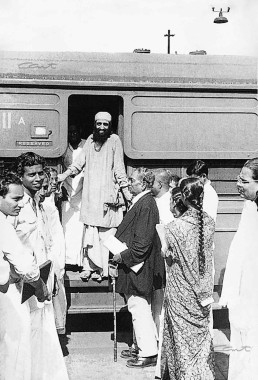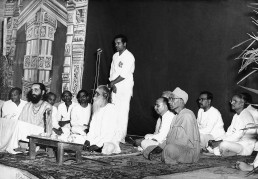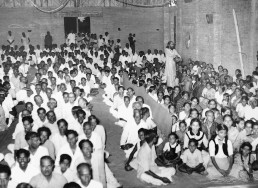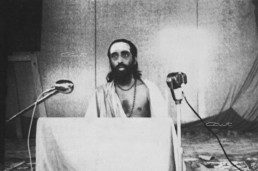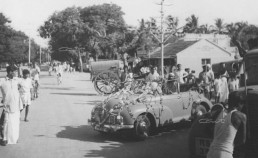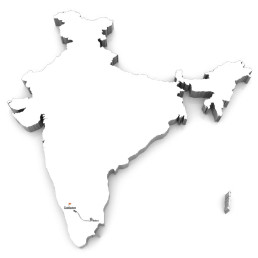
Jnana Yajna 6

Year & Dates:
May 9, 1954 to May 30, 1954

Yajna Topic:
Kenopanishad

Place:
Coimbatore, India.
Pujya Gurudev Swami Chinmayananda’s skilful use of English, a foreign language, to unravel the glory of the ancient Vedic scriptures was his singular contribution. An important colonial legacy that the British left behind was redefined as a unifying medium of a Vedantic awakening across India. Using his command of English to clarify and instill the essence of the ancient Upanishadic revelations from the very first yajna, Pujya Gurudev spearheaded a remarkable revolution.
As in the previous five yajnas, Pujya Gurudev Swami Chinmayananda did not hesitate to reach out and draw in the English-educated doubters as well as eager seekers to His 21-day discourse series on Kenopanishad in Coimbatore.
English for Enlightenment
Those who, with an anglicized outlook, had thought that the scriptures were irrelevant and incomprehensible were fascinated with Pujya Gurudev’s mastery over both the language and the subject of Vedanta. The audience did not need to know Sanskrit. Every word in Sanskrit was transliterated, translated, and explained in clear English from his very first yajna in Pune. Often, Pujya Gurudev’s expressions were poetic and painted a graphic picture. While indicating how the Infinite Brahman is inexplicable, Pujya Gurudev said: “We cannot produce the war of rolling thunders through the frail melodies of a flute!! Similarly, words cannot represent or express fully the roaring silence of all-full-nothingness, Pure Consciousness. In their attempts at reaching the Absolute, words pant and fall back as it were!” Throughout the Kenopanishad discourses in Coimbatore, while the vast audience marveled at Pujya Gurudev’s proficiency in English, they also recognized how His teaching went beyond the realm of language.
In Admiration
Recalling the profound influence of the discourses in Coimbatore, Shri R Venkataswamy Naidu of Coimbatore expresses how they served as nourishment for the intellect of all. “For me it was love at first sight. There was a void before and the lectures filled up the void. The scientific nature of our religion was pointed out and Chinmaya showed how the other religions cannot stand the test of modern scientific research. Hinduism, the revered old channel, sans eyes and sans teeth and sans everything, was presented to us as a young maiden of sixteen, smiling, dancing and full of life.”
Photo Gallery
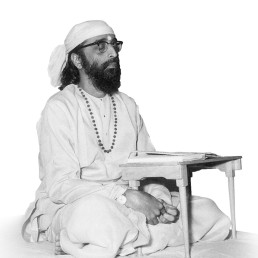
“Think,” Says Pujya Gurudev
Mere book knowledge will not help in fulfilling the Indian philosophy. Unlike the philosophies of the West, to us the Indians a mere academic understanding of an intellectual view of life is not philosophy. To the Indian mind philosophy is at once a view of life and a way of life. A philosopher to us is not a mere idle-dreamer or an intellect-spinner but a hard and factual man of life who should show us also a certain value of life and how best his philosophy can be lived and realised. It is very significant in this connection to note that the word philosophy is in Sanskrit termed as “Darshanam” emphasis being in the availability of those ideas for realisation in the given life.
From Kenopanishad Yajna Prasad, p. 170
The student feels confused and confounded, Thus, to solve this Great Grand Riddle of Life, he approaches his Guru enquiring if there is an independent Eternal “director” who, by his mere “Wish” prompts the mind to alight on the objects? If there be such a a great Illuminator and Controller who is he? What is it? What is my relationship with the Supreme power Divine existing ever so secretively within me, ever vigilant, ever brilliant, ever alert?
It is now the function of the Upanishad to point out this realizable Truth that there is such a Divine Spark in us, which is Eternal Wisdom, the Atman.
From Kenopanishad Yajna Prasad, p. 94
Questioning the Unquestionable
Dive into the mysteries of scriptural texts as we unravel the contemplative style that seeks to express the inexpressible. Discover the efficiency and beauty embedded in the sacred scriptures of the world. Watch this powerful snippet from Kenopanishad talks given at Houston, TX, USA in 1981.
